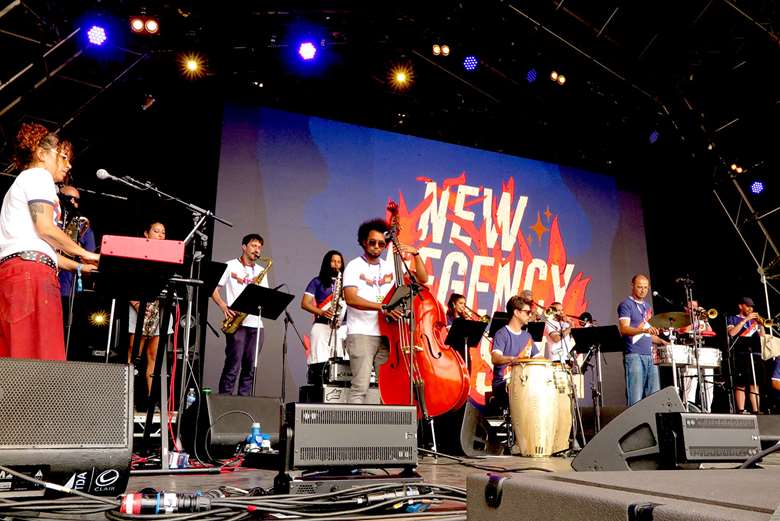New Regency Orchestra, TC & the Groove Family and Laura Misch make for memorable WOMAD moments
Tony Benjamin
Wednesday, July 31, 2024
This gem in the UK festival calendar basked in balmy weather and a dazzling variety of sunny sounds, with plenty of jazz among the global grooves

We need a word for that good-time multicultural big band music using brass and percussion to mash up Latin, African and club dance styles with jazz-funk flourishes – ‘Lafrogroove’, maybe? Whatever, it was well represented across the four sunbaked days of this year’s lively WOMAD programme, woven between the predictably eclectic selection of ethno-musical treats and crowd pleasing headliners.

Exponents included The London Afrobeat Collective, whose sound has definitely gained Latin percussion flavours, and São Paolo’s relentless Bixiga 70 combination of Brazilian style with polyrhythmic grooves. South London collective Mestizo held nothing back in their mix of Colombian dance grooves and what they call ‘British diaspora music’. Theirs is another infectious combination, led by charismatic vocalist Shanteh and embellished with tight brass and uninhibited solos. Even the generally well-modulated Levitation Orchestra (pictured above) couldn’t resist slipping some Ethiofunk and snapping drums into their ‘Premeditatio Malorum’. Their set was more defined, however, by shifts of ambience coaxed by vocalist Plumm and the combination of Axel Kaner-Lindstrom’s trumpet and Ayodeji Ijishakin’s tenor sax.
The biggest ‘Lafrogroove’sensation had to be TC & the Groove Family (below). Despite being up against headliners Gogol Bordello they deservedly pulled in a more-than-capacity dancing crowd to the Soundscape marquee, rewarding them with fiery baritone sax solos from Hannah Mae-Birtwell, Max Purcell-Burrows’ cool trombone and a particularly impressive extended trumpet solo from Grifton Forbes-Amos.

Away from this genre-bending, the New Regency Orchestra opened up Friday’s main stage with a consummate evocation of Nu Yorican Latin-jazz – admittedly with Afro-Cuban roots. Closely steered by keyboard-playing MD Eliane Correa their super-tight brass arrangements stabbed and swooned over meticulous percussion, with Ernesto Marichales’ spry timbales and Jose Cesar’s impassioned vocals vital ingredients in the classic sound. The sheer power of orchestral big band arrangements and the music’s evocative atmosphere soon had people dancing – possibly unwisely - despite the searing midday sun. The stage welcomed New Orleans outfit The 79rs Gang – named for a collaboration between Mardi Gras tribes from the city’s 7th and 9th wards. The 79rs have moved on from their original acoustic voice and percussion music to a more electro-acoustic mix. It’s dance-floor friendly, thanks to synth bass and electric guitar, but the heart of the music remains the mix of drum sounds, chiming cowbell and the semi-chanted lyrics of Big Chief Romeo and Big Chief Jermaine.

Really impressive voices featured in the (slightly) cooler darkness of the Soundscape marquee, with the multi-instrumental Kaidi Akinnibi’s suave vocals and velvet tenor sax only upstaged by a suddenly unleashed instrumental workout that gave his sax room to roar and scour against Jordan Tait’s edgy rock-slab guitar. There was more spaciousness to the heartfelt ethereal music of t l k, washes of synth and violin framing her very clear and pure voice that soared freely before returning to piercingly direct clarity. A similar intimacy pervaded Laura Misch’s tree-framed set (pictured above) at the Ecotricity stage, her voice a distinctive combination of strength and vulnerability surrounded in electronic production enhanced by Levitation Orchestra harpist Marysia Osu and Misch’s restrained Garbarek-recalling alto sax.
South Korean trio Sangjung were billed as ‘folk-swing’ but proved surprisingly otherwise, largely thanks to Nam Seonghun’s virtuosity on ajaeng, a bowed zither. What started worryingly as K-pop soon devolved into a frenzied extended group improvisation reminiscent of the Velvet Underground or Can with Nam extracting continuous raucous howls and crashes within which fragments of melody flickered in and out of sight. It was a brilliant performance, all the more appreciated for being unexpected. They topped it off with the Djangoesque ‘Gyeonbuk Swing’ for good measure, however.
No WOMAD would feel complete without Qawalli, the South Asian Sufi tradition whereby a principal vocalist leads a ‘party’ of singers in semi-improvised call and response, usually working up to a soulful spiritual frenzy underpinned by thunderous tabla. Pakistani master singer (qawwal) Faiz Ali Faiz made two appearances, each equally impressive. The first was billed as Qawwali Flamenco, a collaboration between his party and guitarist Chicuelo’s Spanish ensemble. The common factors of insistent rhythm, impassioned vocal technique and – importantly – handclapping percussion proved very compatible but in some ways it felt an unnecessary compromise for either style. Better by far was the late night Siam Stage session from Faiz Ali Faiz’s party alone which allowed the vocalist to steer the atmosphere to a wonderfully climactic finale that featured Nusrat Fateh Ali Khan WOMAD favourite Musst Musst. As with the best musical improvisation it delivered the pleasure of familiarity with the joy of freshness – much like the WOMAD festival itself.


